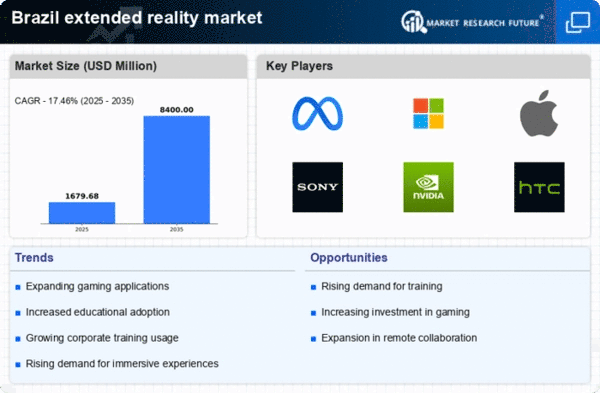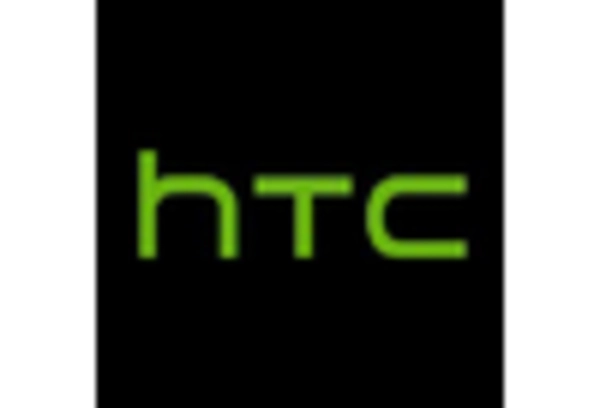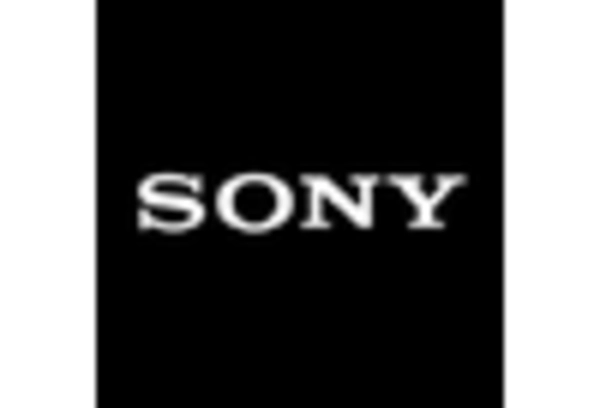Government Support and Initiatives
Government support and initiatives are emerging as a vital driver for the extended reality market in Brazil. Various programs aimed at fostering innovation and technology adoption are being implemented, which include funding for startups and incentives for research and development in extended reality technologies. The Brazilian government has recognized the potential of these technologies to boost economic growth and job creation. As a result, public investments in the extended reality market are anticipated to increase, providing a conducive environment for businesses to thrive. This support may lead to a more robust ecosystem for extended reality solutions, encouraging collaboration between public and private sectors.
Growing Demand for Immersive Experiences
the extended reality market in Brazil is witnessing a surge in demand for immersive experiences across various sectors. This trend is particularly evident in entertainment and gaming, where consumers are increasingly seeking engaging and interactive content. According to recent data, the gaming sector alone is projected to reach a valuation of approximately $2 billion by 2026, driven by advancements in AR and VR technologies. As consumers become more accustomed to these experiences, businesses are compelled to invest in extended reality solutions to enhance customer engagement and satisfaction. This growing demand is likely to propel the extended reality market forward, as companies strive to meet the evolving expectations of their audiences.
Rising Interest in Training and Simulation
The extended reality market in Brazil is experiencing a rising interest in training and simulation applications across various industries, including manufacturing, aviation, and healthcare. Companies are increasingly recognizing the benefits of using VR and AR for employee training, as these technologies provide immersive and interactive learning experiences. For instance, simulations can reduce training costs by up to 50% while improving retention rates. As organizations seek to enhance workforce skills and efficiency, the demand for extended reality solutions in training is likely to grow. This trend indicates a shift towards more innovative and effective training methodologies, positioning the extended reality market as a key player in workforce development.
Increased Adoption in Retail and E-commerce
The retail and e-commerce sectors in Brazil are increasingly adopting extended reality technologies to enhance customer experiences and streamline operations. Retailers are utilizing AR applications to allow customers to visualize products in their own environments before making a purchase. This trend is supported by a report indicating that 70% of consumers are more likely to purchase a product if they can experience it through AR. As e-commerce continues to grow, the extended reality market is expected to benefit significantly, with businesses investing in these technologies to differentiate themselves in a competitive landscape. This adoption is likely to reshape the way consumers interact with brands and products.
Technological Advancements in Hardware and Software
Technological advancements play a crucial role in shaping the extended reality market in Brazil. Innovations in hardware, such as more powerful processors and lightweight headsets, are enhancing the user experience and making extended reality more accessible. Additionally, software developments, including improved graphics and user interfaces, are facilitating the creation of more sophisticated applications. The Brazilian market is expected to see a compound annual growth rate (CAGR) of around 30% in the extended reality segment over the next few years, largely due to these technological improvements. As hardware and software continue to evolve, the extended reality market is likely to expand, attracting a broader range of users and applications.
















